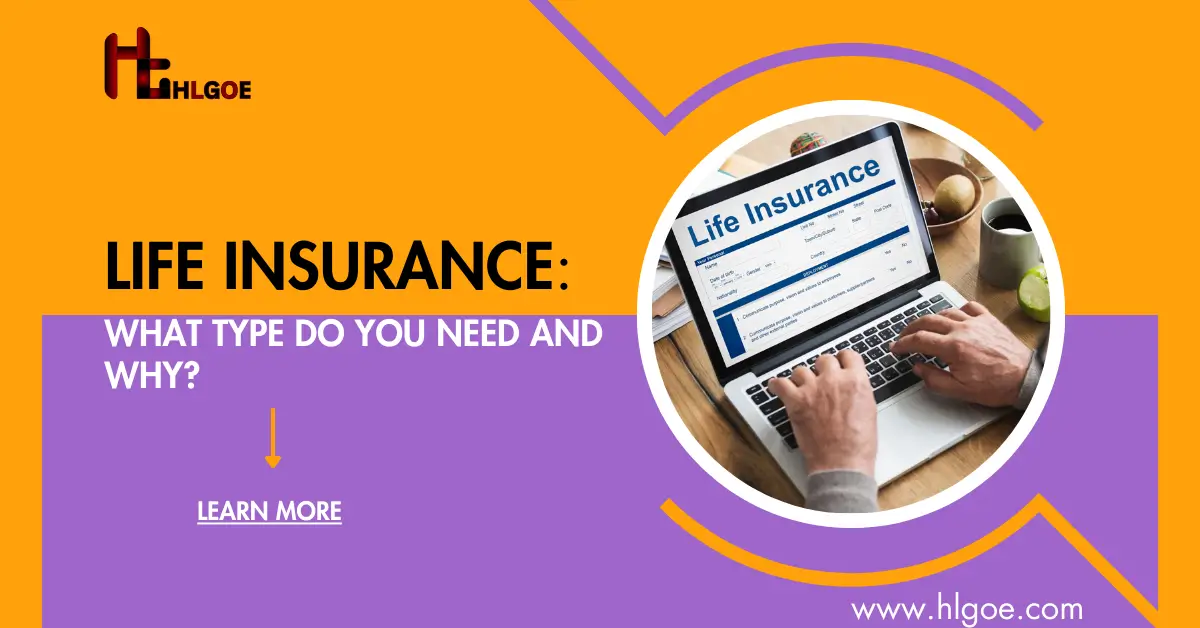Life Insurance: What Type Do You Need and Why?
Life insurance is one of the most important decisions you’ll make for your future, but with so many life insurance types available, how do you choose the right one for you? Whether you’re weighing term life vs whole life, or considering a permanent policy like universal life insurance, the process can seem overwhelming. However, making the right choice doesn’t have to be difficult.
In this post, we’ll walk you through the key factors to consider when selecting a life insurance policy, explain the various life insurance types, and help you understand which one is best for your needs. By the end, you’ll have the tools and knowledge to choose confidently and wisely.
How to Choose the Right Type of Life Insurance
Before diving into the specifics of life insurance types, it’s important to understand how to choose the right policy based on your unique needs and financial goals. Here’s what to consider:
- Understand Your Goals: Protection vs. Investment
- If your main priority is protecting your loved ones in case of your death, term life insurance may be the best choice. But if you’re looking to build wealth and leave a legacy, permanent policies like whole life or universal life insurance may be more suitable.
- Evaluate Your Financial Situation
- How much can you afford to pay in premiums? Term life is typically more affordable, while permanent policies like whole life or universal life tend to have higher premiums. Consider your budget and financial capacity.
- Consider Your Age, Health, and Dependents
- Your age and health will impact the cost and availability of coverage. Younger, healthier individuals can often secure affordable term life insurance. If you have dependents, you may need a policy that provides more long-term security, such as whole life insurance.
- Assess Your Family Situation
- Think about who depends on you financially. Families with young children may want term life insurance to cover specific needs, while older individuals or those with lifelong dependents might consider whole life or universal life insurance for permanent coverage.
Types of Life Insurance Policies and Coverage
There are several life insurance types available. Understanding what each one offers can help you make a better decision. Here’s a brief overview of the most common types:
- Term Life Insurance: Coverage for a specified period, typically 10, 20, or 30 years.
- Whole Life Insurance: A permanent policy that provides lifetime coverage and builds cash value.
- Universal Life Insurance: A flexible permanent policy that combines life insurance with a savings element.
- Variable Universal Life Insurance: A flexible policy where the cash value is invested in various assets.
- Final Expense Life Insurance: A smaller policy designed to cover funeral and burial expenses.
Term Life Insurance
Features:
Term life insurance provides coverage for a set period, such as 10, 20, or 30 years. If you pass away during the term, your beneficiaries receive a death benefit. Once the term expires, the policy ends, and no benefits are paid unless you renew it or convert it to another policy.
| Pros | Cons |
|---|---|
| Affordable Premiums: Typically the most cost-effective option for coverage. | No Cash Value: Does not build any cash value over time. |
| High Coverage for Low Cost: You can get significant coverage for a relatively low premium. | Temporary Coverage: Coverage ends when the term expires, and no benefits are paid unless renewed. |
| Simple to Understand: Easy to compare with other policies and understand. | Premiums Increase After Renewal: If you renew after the term ends, premiums can be much higher. |
Ideal for:
Term life insurance is best for those who need affordable, short-term coverage. It’s perfect for families with young children, homeowners with mortgages, or anyone who needs coverage during specific life stages.
Whole Life Insurance
Features:
Whole life insurance is a permanent policy that provides lifetime coverage. It also includes a savings component, or cash value, that grows over time at a guaranteed interest rate.
| Pros | Cons |
|---|---|
| Lifetime Coverage: Guaranteed coverage for as long as premiums are paid. | Higher Premiums: Premiums are significantly higher than term life insurance. |
| Cash Value Accumulation: Builds cash value over time, which can be borrowed against. | Slow Cash Value Growth: Cash value growth is relatively slow compared to other investment options. |
| Fixed Premiums: Premiums remain the same throughout the life of the policy. | Complexity: Can be harder to understand due to the cash value component and policy details. |
Ideal for:
Whole life insurance is ideal for individuals seeking permanent coverage who also want the benefit of building cash value over time. It’s often chosen by people who wish to leave a financial legacy or who have long-term dependents.
Universal Life Insurance
Features:
Universal life insurance combines permanent coverage with a flexible premium structure. It allows you to adjust the death benefit and premiums throughout your life.
| Pros | Cons |
|---|---|
| Flexible Premiums: You can adjust how much you pay based on your financial situation. | Interest Rate Risk: The cash value grows based on interest rates, which can fluctuate. |
| Flexible Death Benefit: You can increase or decrease the death benefit as your needs change. | Complex Structure: The policy can be more difficult to understand due to its flexibility. |
| Cash Value Accumulation: Builds cash value that can be borrowed or used to pay premiums. | Potential for Increased Premiums: If the cash value does not grow enough, you may need to increase premiums. |
Ideal for:
Universal life insurance is best for those who want flexible coverage that can adapt over time. It’s a good choice for individuals with changing financial needs, such as people with fluctuating incomes or those approaching retirement.
Variable Universal Life Insurance
Features:
Variable universal life insurance combines flexible premiums and death benefits with the ability to invest the policy’s cash value in a variety of securities such as stocks, bonds, or mutual funds.
| Pros | Cons |
|---|
| Investment Control: You can choose where your cash value is invested, offering potential for higher returns. | Investment Risk: The cash value and death benefit can decrease if your investments perform poorly. |
| Flexible Premiums and Death Benefits: You can adjust both over time based on your needs. | Complex: This policy requires more management and knowledge to handle the investments. |
| Potential for High Returns: With the right investments, cash value can grow significantly. | Costs for Investment Management: Some policies may charge fees for managing the investments. |
Ideal for:
Variable universal life insurance is ideal for individuals who are comfortable with investment risk and want to take a more active role in how their policy’s cash value grows. It’s suited for those who want the potential for higher returns but are willing to manage the risk involved.
Final Expense Life Insurance
Features:
Final expense life insurance is designed to cover funeral and burial costs. It’s typically a whole life policy with smaller death benefits, generally between $5,000 and $25,000.
| Pros | Cons |
|---|---|
| Affordable Premiums: Generally less expensive than larger policies. | Limited Coverage: The death benefit is typically much lower than other types of insurance. |
| Easy to Qualify For: No medical exams required for most applicants, especially seniors. | No Cash Value or Investment: Does not build cash value or offer investment opportunities. |
| Simplicity: Simple to understand and easy to apply for. | Restricted to Funeral Costs: The benefit is mainly for funeral expenses and not broader financial needs. |
Ideal for:
Final expense life insurance is ideal for seniors or individuals who want to ensure that their funeral and final expenses are covered without burdening their family. It’s also a good option for those with limited budgets or health concerns.
Other Types of Life Insurance
In addition to term life, whole life, and universal life policies, there are several other life insurance types designed to address unique needs. These policies offer flexibility, specific coverage, or additional benefits, allowing you to tailor your protection to your life stage and financial situation.
Short-Term Life Insurance
Features:
- Provides temporary coverage, typically ranging from 6 months to 3 years.
- Often used as a stopgap or transitional policy.
- Does not accumulate any cash value.
| Pros | Cons |
|---|---|
| Affordable Premiums: Shorter coverage periods typically result in lower premiums. | Temporary Coverage: Coverage ends when the term expires. |
| Quick to Obtain: Easy approval process, ideal for immediate coverage needs. | No Cash Value: Does not build cash value or provide long-term benefits. |
| Flexible Terms: Provides short-term protection when you need it most. | Limited Coverage: Coverage may not be sufficient for long-term needs. |
Ideal for:
- Individuals in transitional stages of life (e.g., between jobs or awaiting approval for long-term coverage).
- Those needing coverage for a specific, short-term financial responsibility.
Indexed Universal Life Insurance (IUL)
Features:
- A type of universal life insurance with cash value linked to stock market indexes (e.g., S&P 500).
- Provides the potential for higher returns with some protection from market losses.
- Flexible premiums and death benefits.
| Pros | Cons |
|---|---|
| Potential for Higher Returns: Cash value can grow faster due to index-linked growth. | Caps on Returns: Growth is tied to an index but often has a cap on maximum returns. |
| Downside Protection: Minimum guaranteed return protects from market downturns. | Complexity: Requires understanding of the market index and caps. |
| Flexible Premiums and Death Benefits: You can adjust both as your needs change. | Fees and Costs: Higher fees due to the complexity and management of investments. |
Ideal for:
- People seeking permanent life insurance with the opportunity for greater cash value growth through market performance.
- Those willing to accept some market risk for potentially higher returns, with the benefit of downside protection.
Supplemental Life Insurance
Features:
- Additional coverage often offered by employers, typically as term life but can include whole life or universal life policies.
- Can be purchased to supplement an existing policy, increasing coverage or adding benefits.
- Available with flexible coverage amounts.
| Pros | Cons |
|---|---|
| Low-Cost Option: Often available at a lower cost through employers. | Limited Control: May have restrictions on customization and the amount of coverage. |
| No Medical Exams: Many policies do not require medical exams for approval. | Employer-Dependent: Coverage may end if you change jobs. |
| Convenient Enrollment: Simple to sign up for if provided by your employer. | Insufficient Coverage: May not be enough if you have significant financial obligations. |
Ideal for:
- Employees looking for affordable coverage to supplement an existing employer-provided policy.
- Individuals who want extra coverage without undergoing medical exams.
Group Life Insurance
Features:
- A life insurance policy offered to a group of people, typically through an employer, association, or union.
- Often available at a lower cost because it covers multiple individuals under one policy.
- Can be term life or whole life insurance, though term life is more common.
| Pros | Cons |
|---|---|
| Affordable Premiums: Group rates typically make premiums more affordable than individual policies. | Limited Coverage: May not provide enough coverage for your needs. |
| Easier Qualification: Often no medical exams required, especially for employer-provided plans. | Employer-Dependent: If you leave your job, you may lose coverage or face higher premiums to convert it to an individual policy. |
| Convenient: Coverage is automatically offered through your employer or group. | Not Customizable: Policies may not allow for customization to suit individual needs. |
Ideal for:
- Employees or members of a group (union, professional association) looking for affordable coverage.
- Those who want basic life insurance but don’t require high amounts of coverage or additional customization.
Accidental Death & Dismemberment Insurance (AD&D)
Features:
- Provides benefits if the insured person dies or suffers severe injury (such as the loss of a limb or sight) in an accident.
- Usually a rider on another life insurance policy or available as a standalone policy.
- Limited to accidental causes, excluding natural causes or illnesses.
| Pros | Cons |
|---|---|
| Affordably Priced: Typically less expensive than standard life insurance. | Limited Coverage: Only pays out for accidents, not for deaths from natural causes or illnesses. |
| Quick Payouts: Benefits are paid out quickly after an accident. | Narrow Scope: Coverage is restricted to accidental causes, leaving gaps in protection. |
| Easy to Add: Often available as a rider on other life policies or as a standalone plan. | No Cash Value: Does not build any cash value or provide long-term benefits. |
Ideal for:
- People looking for additional coverage in case of accidental death or severe injury.
- Individuals who engage in high-risk activities (e.g., driving, outdoor adventures) or have occupations with higher accident risk.
Compare Different Types of Life Insurance
Here’s a side-by-side comparison to help you quickly identify the key differences between the most popular life insurance policies:
| Policy Type | Coverage | Premiums | Cash Value | Flexibility | Ideal For |
|---|---|---|---|---|---|
| Term Life Insurance | Temporary (10-30 years) | Low | No | Low | Families with children, short-term needs |
| Whole Life Insurance | Lifetime | High | Yes (builds over time) | Low | Those wanting permanent coverage, legacy planning |
| Universal Life Insurance | Lifetime | Medium to High | Yes (grows with interest) | High | Those seeking flexibility and long-term coverage |
| Variable Universal Life Insurance | Lifetime | High | Yes (investment options) | High | Those comfortable with investment risk |
| Final Expense Insurance | Small (funeral costs) | Low | No | Low | Seniors or individuals looking to cover funeral costs |
FAQs About Life Insurance: What Type Do You Need and Why?
1. What’s the difference between “term life” and “whole life” insurance?
While term life insurance provides coverage for a specific period (10, 20, or 30 years), whole life insurance offers permanent coverage that lasts for your entire life. Whole life also includes a cash value component that grows over time, whereas term life does not build cash value. Essentially, term life is more affordable and offers temporary protection, while whole life is a more expensive but permanent solution that can also serve as an investment.
2. Do I need life insurance if I don’t have dependents?
Even if you don’t have dependents, there are still situations where life insurance might make sense. For instance, if you have debts (like student loans or a mortgage), life insurance can help prevent your family from inheriting those obligations. Additionally, if you’re planning to leave a legacy or want to cover funeral expenses, a whole life or final expense insurance policy could be beneficial.
3. Can I convert my term life insurance to whole life insurance?
Yes, many term life insurance policies offer a conversion option that allows you to convert your term policy to a whole life policy without undergoing a medical exam, provided you’re still within the conversion period (often during the first 5 to 10 years). This is a good option if your life circumstances change and you decide you need permanent coverage later on.
4. Is life insurance taxable?
In most cases, the death benefit from a life insurance policy is not taxable for the beneficiary. However, if the policy’s cash value has accumulated interest or earnings, those may be subject to taxes. It’s important to consult with a tax professional or financial advisor to understand the potential tax implications based on your specific situation.
5. How do I know how much life insurance coverage I need?
The amount of coverage you need depends on your financial goals, the size of your family, your income, and any debts you may have. A common rule of thumb is to have coverage that’s 10-15 times your annual income. Additionally, if you have large debts, college tuition for children, or other financial responsibilities, you may need to increase your coverage to ensure your family is well taken care of.
6. What happens if I outlive my term life insurance policy?
Once your term life insurance policy expires, your coverage ends, and no benefit is paid out unless you decide to renew or convert the policy (if allowed). Some policies allow you to extend your coverage, but premiums may increase significantly, especially as you age. If you outlive your term life insurance and still need coverage, you may consider switching to whole life or universal life insurance.
7. Can I have multiple life insurance policies?
Yes, you can have multiple life insurance policies. Many people take out multiple policies to cover different needs at different stages in life. For example, you might have a term life policy for specific financial needs (such as covering a mortgage) and a whole life policy for long-term wealth-building or funeral expenses.
8. What is the cash value in whole life insurance, and how does it work?
The cash value in whole life insurance is a savings or investment component that grows over time. A portion of your premium goes toward building this cash value, which accumulates at a guaranteed interest rate set by the insurance company. You can borrow against it, use it to pay premiums, or in some cases, surrender the policy for its cash value. However, any loans against the cash value will reduce the death benefit if not repaid.
9. Is life insurance worth it if I’m healthy and don’t have dependents?
Even if you’re healthy and don’t have dependents, life insurance can still be valuable. First, premiums tend to be lower when you’re younger and in good health, so it’s a good time to lock in a policy before your health status changes. Additionally, life insurance can serve as a tool for estate planning, leaving a financial legacy for loved ones, or covering future expenses like funeral costs.
10. Can I cancel my life insurance policy anytime?
Yes, you can cancel most life insurance policies at any time. However, if you cancel a whole life or universal life policy, you may lose the accumulated cash value (depending on how long the policy has been active). For term life insurance, you may not receive any cash value, but your premiums will stop once the policy is canceled. Be sure to review the terms of your policy and speak with your insurer before making any decisions.
11. What are riders, and do I need them with life insurance?
Riders are add-ons to your life insurance policy that provide additional coverage or benefits. For example, a waiver of premium rider can waive your premiums if you become disabled, while a child rider can provide coverage for your children. Riders can be beneficial depending on your personal or family needs, but they typically come with an added cost. Consider which riders may be worth the investment based on your life circumstances.
12. Will life insurance premiums increase over time?
For term life insurance, premiums remain fixed for the duration of the policy’s term (e.g., 10, 20, or 30 years). However, once the term ends, premiums may increase significantly if you choose to renew. Whole life and universal life premiums are generally fixed, but for universal life, your premiums can fluctuate depending on your chosen plan and the policy’s cash value performance.
13. What is the difference between life insurance and accidental death insurance?
Life insurance typically covers death from any cause, including illness, natural causes, or accidents. Accidental death insurance specifically covers death resulting from an accident, such as a car crash or a fall. It may be purchased as an additional policy or as a rider on a standard life insurance policy, but it usually has a more limited scope and higher premiums for the coverage provided.
14. Can life insurance be used as an investment?
Some life insurance types, particularly whole life and universal life, offer an investment component in the form of cash value. These policies allow you to build wealth over time as part of the insurance, making them dual-purpose products. However, if you’re primarily interested in investing, you may want to compare the returns on a life insurance policy with other investment vehicles (like mutual funds or retirement accounts) to ensure you’re getting the best growth potential.
15. How do I choose between term life vs whole life insurance?
Choosing between term life vs whole life insurance depends on your goals. Term life insurance is ideal if you need affordable coverage for a set period (e.g., while raising children or paying off a mortgage) and don’t need permanent coverage. Whole life insurance, on the other hand, is better if you want lifelong coverage and the added benefit of building cash value over time. It’s important to evaluate your financial situation, future needs, and budget before making a decision.
Conclusion
Choosing the right life insurance policy is an important decision that requires careful thought. Whether you opt for the affordable protection of term life insurance, the long-term investment potential of whole life, or the flexibility of universal life, the key is to choose a policy that aligns with your needs and goals. By understanding the differences between life insurance types, you can make an informed choice that gives you peace of mind knowing your loved ones will be protected.







